The Arabic Wedding Vows – Matrimonial success, Arabic language fail!
(If you haven’t read Milestones 1 and 2 – “A cup of Tea” and “Signing the Contract”, this post will make more sense once you have read those). And the title of this post comes from the movie My Big Fat Greek Wedding (2002).
Learn Arabic through Arabic Weddings
There I was, standing at the front of an Egyptian church in Cairo, about to say my Arabic wedding vows in front of hundreds of people. My about-to-be wife was standing beside me looking gorgeous, rows of smiling faces stretched as far back in the seats as I could see, and I had my Arabic vows memorized. At least, I thought I did…. (you can probably see where this is going…)
——REWIND——
My first milestone was ordering a cup of tea in Arabic. The second big milestone was signing a rental contract. This is the third milestone – my wedding vows. In Arabic. I’m going to get vulnerable in this post and tell you all kinds of details about my personal life! Introduce you to my wife Heidi. And just in case you haven’t figured it out yet, that’s NOT me in the wedding picture above. Keep reading.
Living in the slums
In 1992 I returned to Cairo after a summer away, and moved into a poor area called 3ezbet Kheerallah. My decision to learn Arabic was about to go into overdrive. The area had electricity, but no running water in our building, and no English speakers. I was grateful for the electricity, didn’t mind the running water (it was like camping for a year – I just had to go down to the street and bring up buckets of water), and was happy about the English speakers. Some of my favorite memories of Egypt are sitting on the roof of my building at night under the moon, sipping tea with friends as I shoo-ed away the chickens and geese.
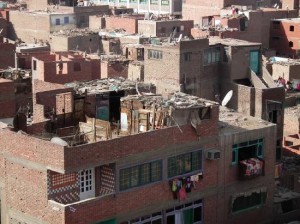
Living in a sha3bi / شعبي area (usually translated as “popular”, in the sense of “full of people”, but would be better understood in terms of being a low socio-economic area) has one huge advantage over other areas for someone who wants to learn Arabic, and that is that there are few other people who speak languages other than Arabic. This means that to make it through your everyday life, you are speaking Arabic all the time. All your interaction is in Arabic. Shopping, walking, living, socializing, working. This was in the early 90s, and life was a bit simpler back then. Revolutions had not happened yet. Crime was very low. Insurgencies were very limited in scope, and far away. It was a fun place to live for a young, single guy.
Meeting THE girl, and some cultural background
Speaking of single, I had no intention of getting married in Egypt. I wasn’t for it or against it, it just had never occurred to me. I was still studying Arabic formally at the American University in Cairo at the time. As my second year in Egypt progressed, I became increasingly aware of one particular young woman from my group of friends at the university. Yup, it was starting. I won’t go into all the romantic details. 🙂 But I will give some background info on how this stuff worked for us, culturally.
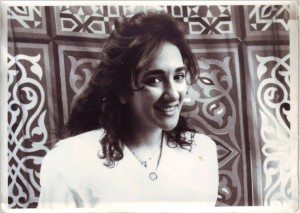
My wife is part of the Christian minority in Egypt. Some people are surprised to learn there are Christians in Egypt, or that they make up somewhere around 10% of the population. The majority of my friends in Egypt up until that time had been Muslim, although I am not Muslim. I was living with a Muslim family in 3ezbet Kheerallah and loving it, and was fairly confident in how to live and interact comfortably in a Muslim setting. I have nothing but respect and love for my Muslim friends, colleagues, and students. I feel the same back from them, every day (I think I’ll make that the subject of a future blog post). Stepping into the Christian environment was new, fun, and a learning process.
Unlike some other non-Arab Muslim countries with Christian minorities, the cultural differences between Muslims and Christians in Egypt are relatively few. There are obviously certain differences in religious belief and practice, but as far as cultural values, morals, language, clothing (apart from the Hegab/veil worn by many Muslim women), and most other things, it is not easy to distinguish the religion of an Egyptian until deeper interaction takes place.
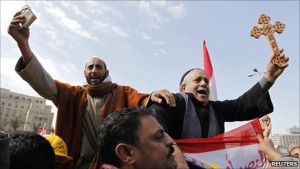
Credit: http://www.parliamentofreligions.org/news/index.php/2011/02/2862/
By typical Western standards, I grew up in a relatively devout Christian home in Canada. This made it easy for me to understand and appreciate the Egyptian Christian values I was now being exposed to. Some of it was new. The family was much more involved than I was used to, and were a big part of the decision-making process. If you’ve ever seen the movie “My Big Fat Greek Wedding”, there were definitely some similarities! In the time leading up to our official engagement, after we had decided to get married, we were allowed to be “alone” in a public place once per week on a “date”. Good times!
When it came to marriage in Egypt, because I am a Canadian we had a civil wedding to cover the legal side of things, followed a few days later by the “real” wedding in a church.
Classical Arabic in front of the crowd
That’s how I found myself at the front of the crowded church on January 13, 1995, smiling and having a blast, and fully confident in my upcoming moment of Arabic awesomeness as I said my vows to Heidi (that’s my wife’s name, due to an Austrian aunt who married into the family). Ok, I have to be honest… I wasn’t really thinking about the way it was helping me learn Arabic. I had bigger things on my mind. But in hindsight, it was still an Arabic milestone.
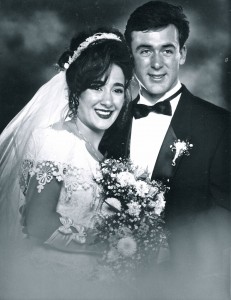
Except that suddenly my Arabic didn’t work. The pastor/minister was saying a full line of the vows, and then I would repeat after him. I don’t really remember all the details, except that suddenly my mouth was very, very dry. It got to the key moment:
Minister: …أنا أندرو أَتَّخِذُكِ يا هَايْدي (waits for me to repeat)
(ana Andrew attakhidhuki ya Heidi…)
(I, Andrew, take thee Heidi…)
Me: …أنا أندرو أَتَّخْ.. أَتُّخِ.. أَتْذَخْ.. أَخْتَذ
(ana Andrew attakh… attukhi… atdhakh… akhtadh…
(I Andrew blergh… glurk… blagh… gleep… – and more attempts to say that one tongue-twister of a word for “take”)
The audience was waiting in painful silence. The Minister was looking at me in pity. My bride had that “he’s so cute when he tries to speak Arabic” look on her face.
The problem was that in every day life, we don’t use classical Arabic as we speak. We use Egyptian Colloquial Arabic, or what is often called 3aamiyah عَامِيَّة ). It is much simpler to speak… like about 1000 times simpler, particularly during your wedding ceremony in front of hundreds of people as you vow the rest of your life into a new state of being, standing beside your breathtakingly beautiful wife-to-be. But classical Arabic is used for formal occasions, including religious occasions, and this was one of those occasions. These Arabic wedding vows had one or two words that were pretty tough in classical Arabic… and I was stuck on “attakhidhuki”. In the middle of our Arabic wedding.
I kept trying. It wasn’t working. It felt like 5 minutes of trying had passed (it was probably less than 10 seconds). Desperate times call for desperate measures. I switched to Colloquial.
Me: !أْخْدِك يا هايدي! خَلَاص
(akhdik ya Heidi! Khalaas!)
(the dynamic equivalent of saying “I’m taking you girl! Enough already!”)
The tension broke, the whole church had a big laugh, everyone breathed a sigh of relief, and the minister finished my vows with me, although he was careful to go one word at a time and very slowly through everything else I had to repeat. The ceremony finished, the huge party started in the hotel ballroom, and we were married. I had made it through my third Arabic language milestone… barely.
My wife’s English is as strong as her Arabic (she is a native Arabic speaker), but that didn’t stop things from becoming very fun and interesting as far as Arabic learning went. It’s been more than 20 great years. More on that in future posts.
Lessons Learned:
- Your inner state – emotions, nervousness, fear, your state of mind, everything you are feeling – has a huge effect on your ability to produce a foreign language at any particular time!
- Never be afraid to laugh at yourself as a language learner. Look at it as an adventure, and don’t take yourself too seriously.
- Surround yourself with people who care about you, and you can make unlimited language mistakes with no stress
Credit for Arabic Wedding Picture: http://www.theweddingspecialists.net/tag/arab-wedding

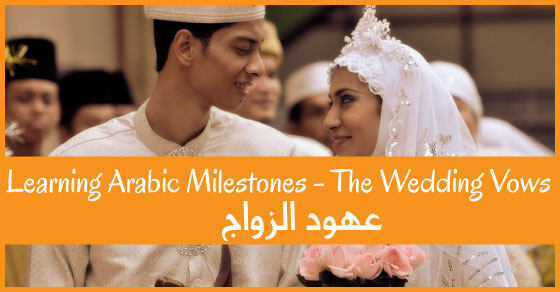
 RSS - Posts
RSS - Posts
This post is so very sweet… and funny, too!
I am a sign language interpreter from Argentina who is now starting to learn arabic as well. And I can relate to everything you just wrote here, specially assure you that those final tips are the very key of mastering any language. Laughing is the best way of learning.
Thank you for sharing your experiences, I’ll be looking forward to read more of these intercultural stories.
Shukran 😀
Thanks María! Great to hear from you. Feel free to send me any questions or feedback at any time. – Andrew